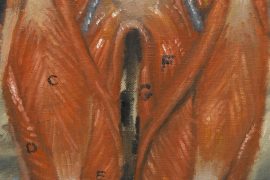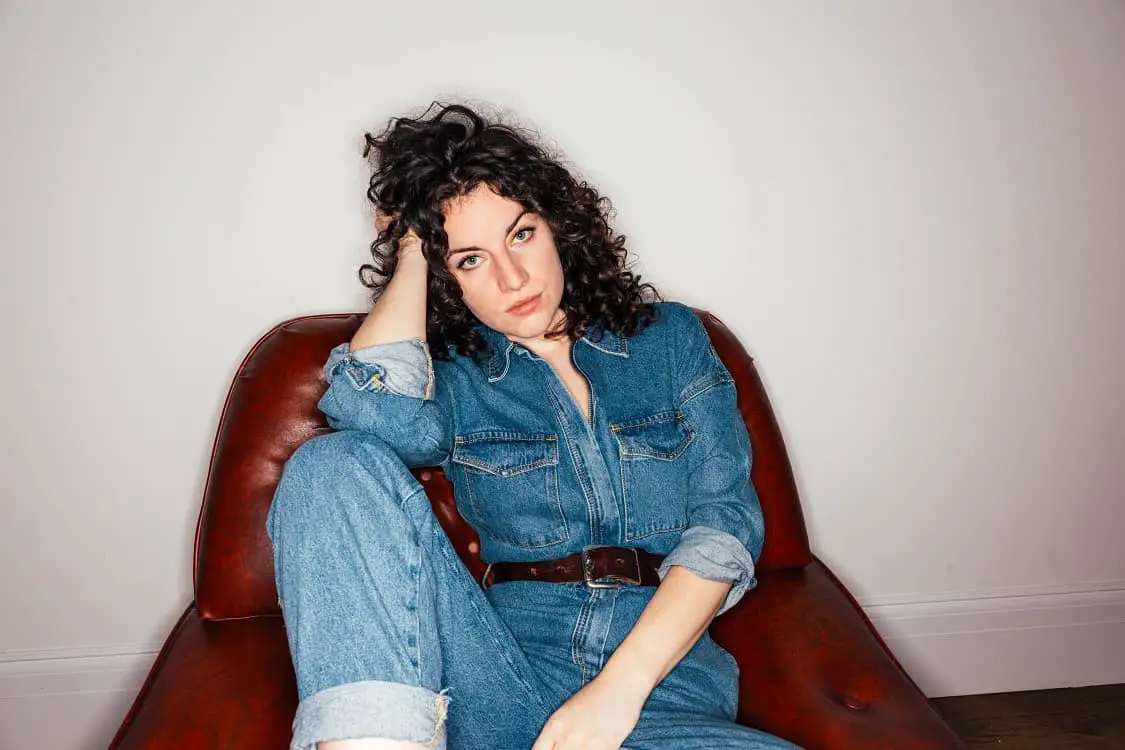Nonetheless, he made the most of his unique circumstances, happily flailing about to deep, synthesized basslines and four-on-the-floor beats with his party-crashing best friend, whose dad DJ’d in the same traveling collective as Groves’. And when the musicians weren’t making partygoers sweat in the middle of nowhere, they were doing so in the comfort of their own Mediterranean climate – as his father played local sets by the bay, Groves witnessed passersby gravitate toward the house music. It was an unusual upbringing, but a musically charmed one.
“Random people would just come over and start dancing for hours, and I always thought that was so normal,” he tells me on a brisk September night in Normal Heights, one of San Diego’s more artful neighborhoods. It’s a Saturday, and the 24-hour coffeehouse we’re outside of is typically stuffed with busybodies. At surrounding porch tables, folks are chatting about their own worlds, entirely unaware that a promising artist is sitting just a few feet around the corner, drinking a Vietnamese iced coffee while fondly remembering his “normal” childhood observations – those of which he now admits were bizarre, although formatively significant.
The mental preservation of such house-inflected recollections is expected from someone like Groves, a 21-year-old singer-songwriter and producer who markets himself as a purveyor of danceable music under the moniker Oshin, a reconfiguration of his given middle name. “It’s not that deep,” he laughs, then raising his voice a few octaves in preparation of emulating his mother’s voice, “I just wanted a beautiful name for my child.”
So, Jonas Ocean Groves it was, and Oshin he became. The title is a repossession of an expired insecurity – other kids used to tease the validity of an eccentric name like Ocean – and, for those who like connecting the dots, perhaps backdrops the scene of “Night Kill,” Oshin’s debut single released late August. Groves’ alias and eerie, experimental entrance into the indie sphere are both centered on facing the formerly unapproachable, turning discomfort into peace.
Listen: “Night Kill” – Oshin
But discovering solace in oneself via brooding, bedroom creations was no overnight feat for Groves. “Night Kill” consumed his headspace for “literally three years,” he confesses with a smile that obviously signifies plenty of emotions, including liberation and relief. Above all, that smile represents the satisfaction of growth – and indeed, Groves has grown. When I ask him how it all started, he talks about being 17 years old, playing surf punk in a local band called Groms.
“It wasn’t for a super long time, but that was kind of my first exposure to the music scene – playing shows, writing any kind of music,” he explains, later noting that the stint’s ending marked the beginning of his more serious, solo endeavors, which manifested into the most fundamental form of “Night Kill.” At the track’s inception, Groves was still new to the ropes of legitimacy – producing, writing lyrics, composing a song. In his own own words: “I didn’t know fucking anything.” Yet, he persisted with the project, determined to ignore any internal voices trying to convince him that “Night Kill” was a dead concept, meant to stay within the confines of his own, private space.
“I came up with the hook (for it), the first notes, that are like ‘do-do-do,’ that loop during the whole song,” Groves illustrates the arrangement with waggling fingers and continues, “and that was when I was probably 18. I kept going back to (“Night Kill”) when I wanted to progress as an artist. It was a thing that was always there, and I was like, ‘am I ever going to finish this?’”
Spoiler alert: he did. And today, Groves retrospectively looks at the protracted development of “Night Kill” to be quite necessary. It’s the sonic foundation of his artistry, the first fragment of Oshin that’s been allowed a place in reality – it’s also a piece of Groves’ mind that his like-aged listeners can feel knotted to, not in a shackled way, but in an enveloping, spiritual sense.
I’m sinking in the ocean to flood my wounds
I know my intuition keeps tethering me to you
I’ll drink deep, I won’t think, if it means it’s done
But I’m afraid to say my own name
Instrumentally, “Night Kill” replicates dark, shadier tones of everyday ideas; the opening beat sounds like an anxious, muffled heartbeat, and its chorus is submerged in undulating synths. “I’m sinking in the ocean to flood my wounds, I know my intuition keeps tethering me to you,” Groves sings, his voice deep and apathetic, yet demanding of more attention that the electronica beneath it. In its choral moments, “Night Kill” feels like a moodier, sub-subterranean rendition of Porches’ “Underwater,” but even that parallel is made for the simple sake of comparison, and after a dozen or so listens, an artistic point of reference for Oshin’s first offering is difficult.

The track is experimentalist, in this sense – abstract and maybe leaving its audience slightly dazed. it’s reflective of the weirder side of Groves’ childhood, speckled with the obscurities of Crystal Castles, Bjork and on occasion, random gems burned to his father’s hard drives. At the same time, there’s another side to “Night Kill” that’s familiar; its structure and lyricism pull from pop, serving to ground the less concrete fragments of the track. Through this songwriting, listeners are introduced to yet another influence – his pianist mother.
“I thought it was cool to hear what’s inside of someone mind through music,” he says while comfortably leaning into his chair, reminiscing on how much he cherished the opportunity to be in the with his mom as she played or wrote music on their household piano. “I loved the feeling, the essence of electronic and house because it’s almost otherworldly – so that, mixed with the singer-songwriter aspect of writing lyrics, was most genuine to me,” Groves says, adding that he’s a fan of pop music’s traditional verse-chorus formula. “It’s important for me to make music that people will be able to relate to – I still want to say significant things, but I want people to understand and apply it to themselves. The challenge is coming up with lyrics, and then deciding how I’m going to sing them to convey what I’m feeling in a fresh way.”
For “Night Kill,” that emotion appears as gloomy distress, veiled in blue and angst. Underneath those elements is the resonant message, crafted to hit its listeners close to home, and when I ask Groves the meaning of the song, everything about his project is both increasingly complex and decipherable – experimental pop at its best. “I go on a lot of walks at night,” he begins another anecdote, catching me blindsided and curious to know how his evening strolls are associated with the sensory metaphors of “Night Kill.” Quite magically connecting the points, as any talented storyteller does, Groves talks about the perceived spirituality and mystery of the nighttime, and how he first realized the lyrical meaning of his debut single on one of those enchanted wanders.
“I was like oh my god, this is what it was really about this whole time, that’s crazy,” he mocks an aloof version of himself from earlier this year, further detailing the song’s poetry. “It’s about knowing something detrimental exists in your head – whether its anxiety or an experience or just something you have to deal with – and knowing that it’s going to be hard to deal with and grow from, but you’re afraid to. So you drown it out with distractions – going out, hanging out with people, not being alone or introspective as a way to cover up that thing so you don’t have to fix it just yet.”
Clouds are rolling out and I can’t hide
The night is over-killed, I’m stuck inside
Silence always falls on reasons to divide
When violent nights were the only thing keeping me alive
Dancing on the graves of every kind of reason
And I’ll stay here for the apathetic season
Later, Groves says that the bridge of “Night Kill” represents the realization that “all these distractions are getting weaker, and everything is becoming a lot more visible.” And here lies an intimidating reality that today’s youthful generation can harmonize with – a reality swamped with mental health issues. Simultaneously, his music symbolizes a cohort that’s attempting to handle their psyches with care; millennials are keen on mental health dialogue, and Oshin artistically adds to that discourse.
Earlier, it seemed as if the delayed drop of “Night Kill” was affected by Groves’ imprisonment by perfectionism – now, it’s apparent that he couldn’t be happier with the debut’s timing. “Having mental health as a more mainstream issue normalizes the fact that people have (issues and conditions), so people aren’t writing others off as crazy,” he reasons. “People are learning what things mean, and are acknowledging that others can still function normally, even if their brain works differently, and I think this climate is an interesting time (for “Night Kill” to be released). It’s relevant and I’m glad about that.”
By the end of our conversation, Groves’ iced coffee has vanished, the temperature has mellowed into 68 degrees, and I’m left with a feeling that he could talk about his craft some more – which is precisely why it’s so strange to consider that he’s only offered the universe one song to-date. Indeed, Oshin is still an enigmatic notion to everyone except Groves, and yet, this seems to be something he’s deeply aware of.
“’Night Kill’ is a fragment of a much larger thing – the big picture will be much more clean and balanced,” he confidently says. On the surface, he seems to be reassuring me, personally. But more silently, we both know that he’s communicating at large, sharing something special with those who find themselves affected by “Night Kill” – that something special is a promise of an eventual EP that thematically hinges together ideas of “finding solace in uncertainty” and “repurposing darkness into beauty.” And although there’s no established date for the EP’s release (aside from “sometime next year,” of course), its existence is for certain.
Before bidding our farewells, we stop by his car and he eagerly hands me a pair of wireless headphones; I’m about to hear a demo of a track he’s currently tweaking with. As any perfectionist would, he says it’s a “very rough” version of the final, future product. While attempting to restrain from publicly swaying to its rhythm, I imagine the song in full-flesh, embellishments and all. Earlier in the night, Groves noted that the foundation had been set for the entire EP – this track was part of that groundwork. “I’ve just been putting puzzle pieces together,” he said. “Now I have a good idea of what that puzzle looks like, and I’m just filling the rest in.”
The next song is going to be impressive, a step up from “Night Kill – I decide this as I nod to the beat, sharing a look of contentment with Groves. Then, I give him his headphones back; the cut has ended, and so has my short-lived VIP experience.
Now, we’re all part of Oshin’s waiting game.
— — — —
Connect with Oshin on
Twitter, Instagram
Discover more new music on Atwood’s Picks
Cover photo © Nadia Graily








